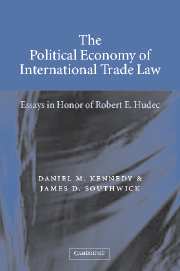Book contents
- Frontmatter
- Contents
- List of contributors
- Preface
- Foreword by E. THOMAS SULLIVAN
- Introduction: An overview of the volume
- Part I The constitutional developments of international trade law
- Part II The scope of international trade law: Adding new subjects and restructuring old ones
- Part III Legal relations between developed and developing countries
- Part IV The operation of the WTO dispute settlement procedure
- 15 Testing international trade law: Empirical studies of GATT/WTO dispute settlement
- 16 The Appellate Body and its contribution to WTO dispute settlement
- 17 A permanent panel body for WTO dispute settlement: Desirable or practical?
- Comment: Step by step to an international trade court
- 18 International trade policy and domestic food safety regulation: The case for substantial deference by the WTO Dispute Settlement Body under the SPS Agreement
- Comment: The case against clarity
- 19 Judicial supremacy, judicial restraint, and the issue of consistency of preferential trade agreements with the WTO: The apple in the picture
- 20 Should the teeth be pulled? An analysis of WTO sanctions
- 21 Problems with the compliance structure of the WTO dispute resolution process
- 22 “Inducing compliance” in WTO dispute settlement
- Bibliography of works by ROBERT E. HUDEC
- Index
18 - International trade policy and domestic food safety regulation: The case for substantial deference by the WTO Dispute Settlement Body under the SPS Agreement
Published online by Cambridge University Press: 02 September 2009
- Frontmatter
- Contents
- List of contributors
- Preface
- Foreword by E. THOMAS SULLIVAN
- Introduction: An overview of the volume
- Part I The constitutional developments of international trade law
- Part II The scope of international trade law: Adding new subjects and restructuring old ones
- Part III Legal relations between developed and developing countries
- Part IV The operation of the WTO dispute settlement procedure
- 15 Testing international trade law: Empirical studies of GATT/WTO dispute settlement
- 16 The Appellate Body and its contribution to WTO dispute settlement
- 17 A permanent panel body for WTO dispute settlement: Desirable or practical?
- Comment: Step by step to an international trade court
- 18 International trade policy and domestic food safety regulation: The case for substantial deference by the WTO Dispute Settlement Body under the SPS Agreement
- Comment: The case against clarity
- 19 Judicial supremacy, judicial restraint, and the issue of consistency of preferential trade agreements with the WTO: The apple in the picture
- 20 Should the teeth be pulled? An analysis of WTO sanctions
- 21 Problems with the compliance structure of the WTO dispute resolution process
- 22 “Inducing compliance” in WTO dispute settlement
- Bibliography of works by ROBERT E. HUDEC
- Index
Summary
The nature of the problem
There has been a dramatic shift in the focus of trade policy concerns in recent years from the barriers that lie at the border to the barriers which exist “within the border.” The General Agreement on Tariffs and Trade/World Trade Organization (GATT/WTO) and other regional trading arrangements have been largely successful in reducing both the levels of tariffs worldwide and the scale of other border measures such as quotas. This has revealed a new and more subtle category of measures which restrict trade – the numerous regulations which governments enact to protect the health and safety of their citizens and the environment in which they live. Such regulations vary tremendously across borders: one nation's bunch of grapes is another nation's repository of carcinogenic pesticide residue. These efforts to protect citizens from the hazards of everyday life have become a virtual minefield for trade policy makers, in part because such differences can often be manipulated or exploited to protect domestic industry from international competition, and in part because even when there is no protectionist intent on the part of lawmakers, through a lack of coordination, mere differences in regulatory or standard-setting regimes can function to impede trade through increasing multiple compliance costs. It has thus become increasingly difficult to delineate the boundaries between a nation's sovereign right to regulate and its obligation to the international trading community not to restrict trade.
- Type
- Chapter
- Information
- The Political Economy of International Trade LawEssays in Honor of Robert E. Hudec, pp. 537 - 574Publisher: Cambridge University PressPrint publication year: 2002
- 12
- Cited by



